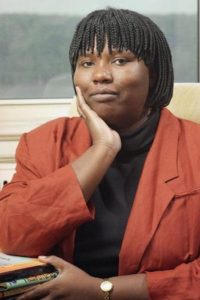
Gloria Naylor
*Gloria Naylor was born on this date in 1950. She is a Black author.
From New York City, her father, Roosevelt, was a transit worker, and her mother, Alberta McAlphin Naylor, was a telephone operator. Naylor claims that as a young girl, her writer's heart "was conceived" in Robinsonville, Miss., where her parents once worked as sharecroppers. Her mother had little education but loved to read. This love was so intense that Naylor’s mother worked extra hours in the fields to earn enough to join a mail-order book club. (Libraries in the South would not admit Blacks at the time.)
Her mother encouraged her to read and gave her a journal to write down her 12-year-old's thoughts; she took the advice to heart. The family moved to Queens in 1963, where Naylor's mother became a Jehovah's Witness, and later, Naylor followed. The church missionary work alleviated her shyness; she traveled and met people. Still, it also sealed her into an enclosed world where she was unaware of the boom of Black literature around her. Naylor left the Witnesses disillusioned and anxious and began full-time work as a switchboard operator. She studied writing at Medgar Evers and Brooklyn colleges in her off hours.
In 1977, when she read Toni Morrison's The Bluest Eye, her first book by an African American woman, she was suddenly inundated with hope. She began to see the possibility of writing about what she knew, to picture herself as a real writer. When she submitted a short story to Essence magazine, the editor convinced her she had a career. Naylor finished her first novel, The Women of Brewster Place, just as she began graduate work at Yale. When it was published in 1983, it won great recognition.
Five years later, it was made into a movie starring Oprah Winfrey. Naylor followed that with Linden Hills (1985), Mama Day (1988), Bailey's Cafe (1992), and The Men of Brewster Place (1998). Apocalypse, morality, transcendence, and redemption take center stage in her novels. But it is racism and politics that hang about in the wings. She has a reason for this. To be Black in America, according to her, is a political construct. Just as it took time to feel she had a voice, she says, "We have yet to feel within this country that we are home."
Black Women in America An Historical Encyclopedia
Volumes 1 and 2, edited by Darlene Clark Hine
Copyright 1993, Carlson Publishing Inc., Brooklyn, New York
ISBN 0-926019-61-9